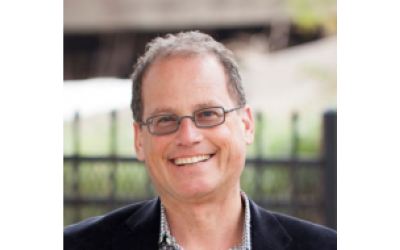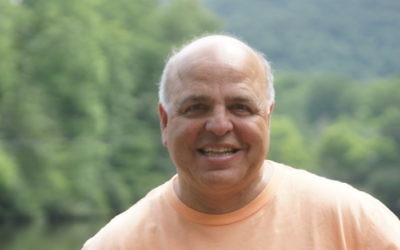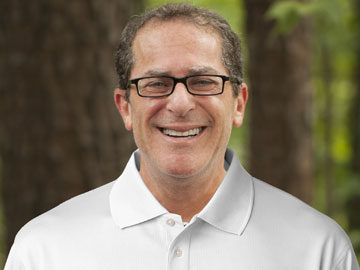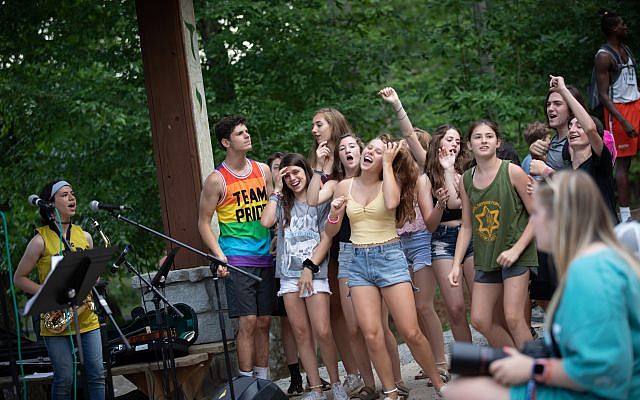Camp Bonds Foster Jewish Continuity
Heading into a new decade, Jewish summer camp has the unique capacity to continue to not only provide fun Jewish experiences but build stronger year-round connections.
Heading into a new decade, Jewish summer camp has the unique capacity to continue to not only provide fun Jewish experiences but build stronger year-round connections and bonds that can last a lifetime.
“I just look around our community and I see the bonds and the connections people have, not just in Atlanta, but across the Southeast” that developed from camp, said Eric Robbins, president and CEO of the Jewish Federation of Greater Atlanta. “I think it’s the roots of Jewish identity for so many of us, but just as importantly, very, very, deep relationships that are multi-generational.”
Robbins attended camp growing up. After his first session at 10 years old, he loved it so much he refused to leave, and ended up staying for the entire summer. “I know today that so many of our children are having the same experience and building the same bonds and the same deep-rooted connections.”
The opportunities camp brings for children to form close bonds in a natural setting is significant in a time of increased technology and social change, Robbins said. “We don’t spend as much time with people, so camp is even more important. It takes us back to the basics of being with people and being in groups.

“I think our way through anything, both good and bad times, are through very strong relationships. I just think camp, when you live with people day in and day out, when you’re immersed in an experience with them, the relationships you build are incredible. And those relationships will get us through the good and the bad times, whatever the world brings us.”
According to those interviewed for this story, camps foster impactful Jewish experiences that allow these types of close relationships to continue throughout the year, both formally and informally, such as through social media, youth movements and life cycle events.
Camp Coleman, which is affiliated with the Union for Reform Judaism, has a youth movement for both middle and high schoolers that helps to maintain a Jewish environment throughout the year. Bobby Harris, Camp Coleman’s director, said a lot of campers love being involved in youth groups and conventions because they have a built-in calendar where they’re able to see their friends from the summer.
“There are a lot of people who keep in touch with their camp friends throughout the year. That’s one way the Jewish connection doesn’t stop after the summer,” Harris said. “Because a lot of our kids come from congregations, when the bar and bat mitzvah scene gets going, a lot of those kids are going to each other’s simchas. That occurs a lot.” Synagogues often help to cultivate the relationships through youth groups or events that center around camp. “A lot of our congregations have a ‘Return from Camp Shabbat’ and a ‘Send-off Shabbat.’… It’s fostering that kind of connection for the kids to come together as campers and see the connection they have between the temple and their camp,” Harris said.
Harris also spoke about the privilege of watching Jewish kids grow up together and continue cultivating Jewish communities. “This will be my 29th summer [at Camp Coleman.] I’ve been able to see kids who invited each other to their bar or bat mitzvah, to their weddings, baby namings, and then seeing their kids off to camp. I’ve watched these groups stay together from when they were 10 or 12 to now when they’re in their 40s.”
Jewish Education Project’s 2019 Gen Z Now study found that teens involved in youth organizations often have a rich history of Jewish formal educational experiences, including camp, and that youth programming throughout the year has a significant impact on how teens see their Jewish identity: “Teens in YSOs [youth-serving organizations] rate themselves higher on almost every GenNow outcome we measured.”

Along with formal youth movements, Camp Coleman uses social media to keep the connections alive throughout the year by engaging people on platforms such as Instagram. During Rosh Hashanah, Camp Coleman posted the recipe for apple brown betty, a popular dessert at Camp Coleman that has become camp tradition, and asked people to tag pictures of themselves eating it. “I would say the more connection to camp throughout the year, the more a person is deepening their connection to the Jewish community and developing their own Jewish identity,” Harris said.
In 2018, the Foundation for Jewish Camp conducted a study called Outcomes & Impacts of Jewish Day Camp to design better surveys that measure the effectiveness of day camps in achieving their missions. “Our research revealed a general consensus among key stakeholders that attending a Jewish day camp not only helps campers develop socially, but contributes significantly to their ‘Jewish journey’ through life.” As an example, a majority of parents (79 percent) rated day camps’ performance as “good” or “excellent” Jewish learning environments based on a study of JCC camps in 2011.
“We are fortunate to have great Jewish camps surrounding the Atlanta community,” said Jay Kaiman, president of The Marcus Foundation. “I see grandparents, parents, and kids today who still talk about their Jewish camp life and how it impacted their Jewish identity. It works. For most kids, it works in shaping Jewish identity and makes them feel part of something bigger than themselves.”
Jim Mittenthal, director of Camp Barney Medintz, is still inspired by his own experiences growing up at summer camp. “The essence of my Jewish soul came from those summers,” he said. Like Harris, he sees campers going out of their way to continue camp relationships throughout the year through Jewish events.
“I’m sent photos of these kids traversing the Southeast attending each other’s bar and bat mitzvahs,” he said. “It’s not just a reunion. There’s something very special about kids wanting to celebrate their Jewish life cycle moments together with their camp friends.”
Holly Kurtz, who was a camper and then program director for Camp Judaea, has experienced firsthand the sorts of deep relationships and community building described by Mittenthal and Harris.
“You just create this automatic bond that nobody else understands because you were in this intense, exciting environment with them and going through the motions with them. I don’t even know how to explain it. I don’t even know how to put in words. They’re different from other relationships,” Kurtz said.
She has many groups of close friends, but camp friends share a different sort of bond. “Whatever happens, if I need something or vice versa, we’re always there for each other. It doesn’t matter how many years have passed; you just end up picking up where you left off.”
Kurtz is planning to send her own two young children to Camp Judaea. “We have been counting down the years since both of our children were born for them to have this experience,” she said. “We know how important it is and how much fun they’ll have, and they’ll create the bonds that we have. We just can’t wait for them to experience that.”
She also knows how incredibly important summer camp is for the development of Jewish children and community. “Camp, in general, is good for kids,” she said. “It teaches them independence; it teaches them responsibility; it teaches them leadership, self-confidence, social skills; and also, most importantly, they learn new skills as well, things they wouldn’t necessarily pick up on somewhere else other than that environment.”
Adding the Jewish aspect to that stack of benefits allows children who may not receive a Jewish background elsewhere to gain it in a fun, informal setting: “They actually may gain more out of it because they don’t realize that they’re even learning.”

Another benefit of camp is that children are given opportunities to build leadership skills that transfer easily to the “real world,” and camp is sometimes worth more, in that way, than other leadership experiences such as internships, Kurtz said. “I worked year-round for Young Judaea and Camp Judaea, and people used to ask me, ‘When are you going to go get a real job?’ And my answer always was that this is the most real job anyone could ever have,” she said. “You’re not only responsible for the lives and welfare of children, but you’re also molding them into future leaders in the Jewish world and just in general. The leadership skills that you develop at camp really help mold you.”
Mittenthal has seen former campers go on to be leaders and volunteers in the Atlanta Jewish community, inspired by the experiences they had at camp growing up. There are many Jewish organizations throughout Atlanta and the United States where the presence of former campers is noticed and appreciated, he said.
“I’m doing what I’m doing because I had that kind of experience Jewishly,” he said. “I think it is woven into everything we do, … nobody is leaving camp just having the things that you see in brochures and websites. They’re leaving with much more depth of a culturally Jewish experience at Camp Barney and a way of choosing to live their life in between summers.”




comments